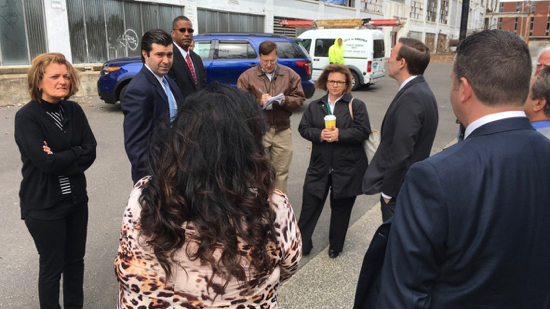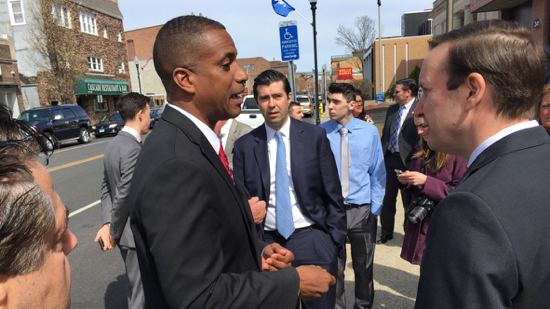 A bill that could make it easier to get polluted properties cleaned up passed the state House of Representatives last week by a wide margin, state Rep. Linda Gentile, D‑Ansonia, announced.
A bill that could make it easier to get polluted properties cleaned up passed the state House of Representatives last week by a wide margin, state Rep. Linda Gentile, D‑Ansonia, announced.
“It’s another important tool in the toolbox in the development of these brownfield properties,” Gentile said during a walking tour of potential Ansonia redevelopment projects along East Main Street April 13.
The bill, which allows nonprofit “land banks” to collect money and finance cleanup operations at brownfield properties, now moves to the state Senate.
If the bill is approved by the Senate, Gov. Dannel Malloy could then sign it into law.
The bill passed the House and Senate last year, but was killed by a Malloy veto. The governor urged lawmakers to tweak the bill and try again, according to the Hartford Business Journal.
The Connecticut Post’s Hugh Bailey did an exhaustive story on the land bank bill last year, detailing the ways it could benefit former factory cities such as Ansonia and Derby.
If passed the bill would allow nonprofit “Connecticut Brownfield Land Banks” to access the same pollution cleanup grants and incentives currently available to local government.
The bill is needed, according to Valley officials, because finding the money, time and expertise to assess and clean polluted properties is expensive and complicated.
Smaller communities such as Derby, Ansonia and Seymour — where economic development directors are part-time or wearing many hats — often don’t have the manpower and resources needed to deal with the process.

A nonprofit land bank, working with public officials, can get the job done more efficiently, proponents say. The land banks would work closely with developers who want to invest in the properties, but are hesitant to do so because of the potential cleanup costs.
“A town or a city could ask one of these land banks to come in, buy the back taxes, acquire a property, get grants to fund the cleanup and then give it to the town for redevelopment,” said Tim Sullivan, the deputy director of the state Department of Economic and Community Development.
Sullivan said there are philanthropic organizations in the state — such as foundations — that want to donate money to clean polluted properties. But the foundations prefer the money flow to something like a nonprofit land bank instead of directly to the government.
One such land bank already exists and is working for Ansonia.
Sheila O’Malley, Ansonia’s grant writer and economic development director, is its chair. Art Bogen, well-known locally for his work alongside the Naugatuck Valley Council of Governments, is its executive director.
More land banks are expected to be created if the bill becomes law.
“It makes it a much easier, smoother process,” said Gentile, a co-sponsor of the bill. She said the bill was approved by the House April 12 by a 147 – 1 vote.
State Sen. George Logan, R‑Ansonia, said he’ll support the bill.
“I will support it, absolutely,” Logan said. “Hopefully the governor will have a change in his thought on that bill.”
Logan said the bill is about encouraging development.
“When you encourage development, people are going to want to come here,” Logan said outside Ansonia City Hall on Main Street last week. “Companies will want to come here. We need more jobs in Connecticut. That’s the only way we can increase revenue. This is a step in that direction.”